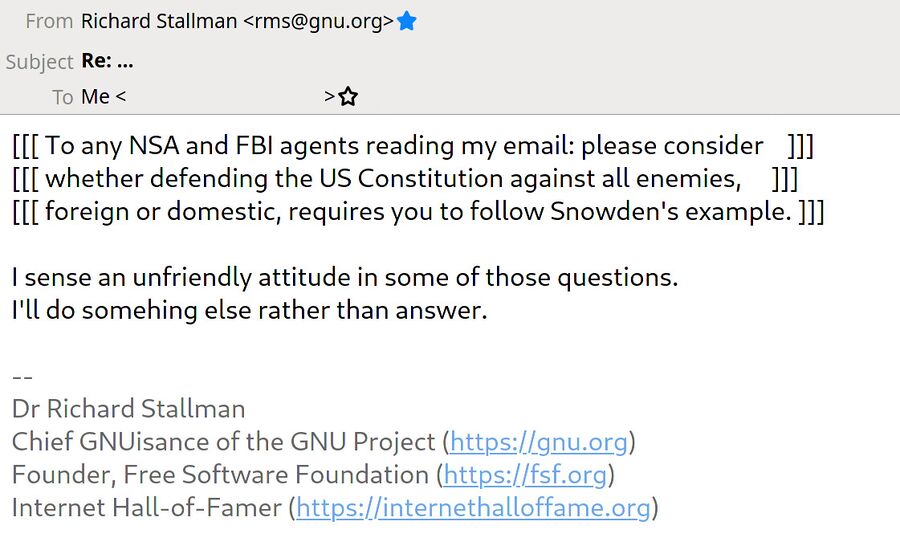Richard Stallman/Questions September 2020
We asked Richard Stallman some questions on September 13th, 2020.
The Questions[edit]
Hello. I have a small website close to nobody reads. It uses the GNU GPL v2 licensed MediaWiki content management system. I would very much like to publish your answers to the following questions. I realize there are a lot of them. Feel free to skip any questions you do not want to answer. I will publish your answers as-is, they can be as long or as short as you want.
Looking back at a long carer advocating for free software, what do you see as your biggest accomplishments?
You have written a lot of free software over the years. What do you believe are the most important program(s) you have written?
What programming language do you prefer, and why?
What, concretely, does a "Chief GNUisance" do?
How long will you remain "Chief GNUisance"?
What desktop environment, if any, do you use on your personal laptop (by that I mean LxQt/Xfce/GNOME/KDE? (or just a console?)
The web is filled with a lot of non-free JavaScript programs that are mostly executed on people's computers without their knowledge or content. Those who know what JavaScript is and are more tech-savvy than average people know about this and know how to disable don't. Is this a acceptable situation?
The LibreJS program that comes with GNU IceCat blocks most free JavaScript because it is not properly marked with a license. Should web developers who write free content management systems bother marking their JavaScript as being free just for one minor web browser extension with close to a zero market share?
Your website stallman.org has a lot of links to mostly political news stories. Do you update and maintain that website yourself? Does the content reflect your political beliefs?
What do you think of the free software movement now being dominated by large corporate interests who prefer to use terms like "open source"?
Canonical's inclusion of the snap package management system seems to be an effort to foist an app store-like ecosystem on the free software world. How dangerous (or concerning) is this solution-looking-for-a-problem to FOSS if it becomes a majority distribution system?
In your talk at Microsoft last year (2019), you mentioned (paraphrasing) that we shouldn't hold a grudge against MS for their past transgressions but judge them by their future actions. Do you feel that their infatuation with improving WSL and contributing more openly to FOSS is a positive outcome or are we at risk of seeing embrace, extend, and extinguish again moving forward? I suppose another way to ask this would be: Is MS turning over a new leaf or could this be an effort to subjugate FOSS under their banner (see: acquisition of GitHub)?
Chinese telecommunications Huawei recently released their Harmony OS as free software under a 3 clause BSD license. What are the dangers of using BSD licensed software made by large multinational corporations compared to using GPL licensed software?
Could the GNU system be developed from scratch by today's programmer?
What are your plans for the future?
Thank you for reading through all these questions. If you also have time to eventually answer some or all of them then that would be great. There is no rush, if you don't have time this week then that's fine. The Internet will probably be there in a month or three.
You can add any statement you like if you want to say something that is not covered by any of the above questions.
The Answer[edit]


Enable comment auto-refresher